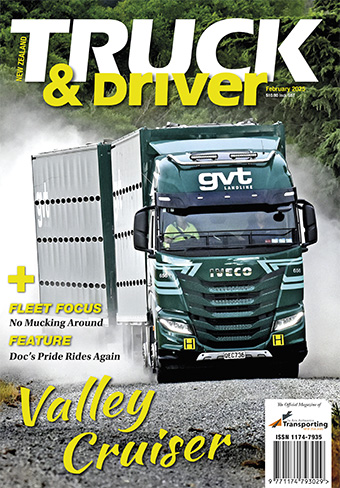Ia Ara Aotearoa Transporting New Zealand News


Cameras about safety...not spying
There has been a bit of discussion in recent weeks about the place of cameras in truck cabs.
What I'm talking about here are driver-facing cameras, rather than those facing forward – pointed at the road ahead.
Unions have voiced concerns and have claimed that these cameras are leading to drivers quitting the industry. The argument is that having a camera pointed at the driver is invasive and leads to a perception that the driver is being watched at all times.
The reality is that the two types of cameras – events-based, triggered when a critical event like hard-braking is engaged…..and sleep detection cameras that sound an alarm if they detect a driver falling asleep – are there to help all road users stay safe, including the drivers they are monitoring.
There is also a growing body of evidence, both here and internationally, about the effectiveness of these devices in lowering accident rates. One camera provider in the United States claims that they have seen a 50% reduction in critical events in just four months of having the cameras installed in their clients' trucks.
...There has been a bit of discussion in recent weeks about the place of cameras in truck cabs.
What I'm talking about here are driver-facing cameras, rather than those facing forward – pointed at the road ahead.
Unions have voiced concerns and have claimed that these cameras are leading to drivers quitting the industry. The argument is that having a camera pointed at the driver is invasive and leads to a perception that the driver is being watched at all times.
The reality is that the two types of cameras – events-based, triggered when a critical event like hard-braking is engaged…..and sleep detection cameras that sound an alarm if they detect a driver falling asleep – are there to help all road users stay safe, including the drivers they are monitoring.
There is also a growing body of evidence, both here and internationally, about the effectiveness of these devices in lowering accident rates. One camera provider in the United States claims that they have seen a 50% reduction in critical events in just four months of having the cameras installed in their clients' trucks.
Technology is also improving rapidly and it is now becoming commonplace overseas for trucks to carry devices that can record both the road and into the cab.
The key is that if this Government is about safety – and they continually tell us they are – then they need to demonstrate that in policy. We know that 93% of accidents across all vehicle types are down to poor driver behaviour. It is therefore likely that more tools will be used to reduce driver errors. It is also likely that if the case for this technology can be proven to reduce accidents further, then they could become mandatory at some stage in the future.
The fact is that the Privacy Act allows for the use of employee video surveillance. Nearly every other sector, particularly retail and wholesale, accommodation and hospitality, rely on employee and customer surveillance for a variety of reasons. Many childcare centres have recordable video surveillance, as do banks and bars.
It is also true that many drivers who were initially opposed to having cameras in their cabs, have accepted the cameras as safety devices and have also found comfort in the evidence that they have provided in circumstances where the driver or company is faced with litigation arising from an incident.
I know through my discussions with the insurance industry that they are considering very seriously the role of dash cameras in the future of New Zealand's vehicle insurance market.
While I acknowledge people's concerns over a growing surveillance culture, this is not the ground to be fighting that battle on. Everybody, whether they are commercial drivers or members of the public taking their kids to school, is entitled to be as safe as possible on the road.
And frankly, we should all take reasonable steps to make the roads as safe as they can be. RTF is therefore not opposed to the use of these devices – and given the high wellbeing value we should all be placing on our drivers and the costs of the vehicle and value of the goods they are transporting, the transport service provider is entitled to take appropriate actions to protect their business, their people, and their reputation.
In a not-unrelated matter, I must admit to being very disappointed recently to hear comments from Justice Minister Andrew Little demanding a higher legal standard and tougher sentences for professional drivers involved in fatal accidents.
"In my view, professional drivers should be held to a higher standard," Little said.
"They are subject to a number of regulations to manage fatigue with them. If sentencing is not reflecting a higher standard for professional drivers then I will look at the statutory guidance in the Sentencing Act."
The comments were given in the context of some high-profile sentencing decisions that involved truck drivers; however, I do not think they are fair. Our drivers do tens of thousands of kilometres per year, driving some of the largest and most demanding vehicles on some pretty shoddy roads.
No driver, professional or not, sets out to have an accident. Minister Little is also traversing a very fine line regarding judicial independence and breaching the rules around ministerial direction.
RTF has approached Minister Little's office for justification of his position and for evidence supporting it. I look forward to his response.




 + EQUIPMENT GUIDE - FREE
+ EQUIPMENT GUIDE - FREE
